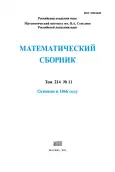Vol 214, No 11 (2023)
Random walks conditioned to stay nonnegative and branching processes in nonfavorable random environment
Abstract
Let {Sn,n⩾0} be a random walk with increments that belong (without centering) to the domain of attraction of an alpha-stable law, that is, there exists a process {Yt,t⩾0} such that Snt/an ⇒ Yt, t⩾0, as n→∞ for some scaling constants an. Assuming that S0=o(an) and Sn⩽φ(n)=o(an), we prove several conditional limit theorems for the distribution of the random variable Sn−m given that m=o(n) and min0⩽k⩽nSk⩾0. These theorems supplement the assertions established by Caravenna and Chaumont in 2013. Our results are used to study the population size of a critical branching process evolving in an unfavourable environment.
 3-36
3-36


Entropy solution for equation with a measure valued potential in hyperbolic space
Abstract
We consider the Dirichlet problem in the hyperbolic space for a nonlinear elliptic equation of the second order with singular measure-valued potential. The assumptions on the structure of the equation are stated in terms of a generalized N-function. It is shown that this problem has an entropy solution.
 37-62
37-62


Dense weakly lacunary subsystems in orthogonal systems and the maximal partial sum operator
Abstract
It is shown that any finite orthogonal system of functions whose norms in Lp are bounded by 1, where p>2, has a sufficiently dense subsystem with lacunarity property in the Orlicz space. The norm of the maximal partial sum operator for this subsystem has a better estimate than it is guaranteed by the classical Menshov-Rademacher theorem for general orthogonal systems.
 63-88
63-88


Characters of classical groups, Schur-type functions, and discrete splines
Abstract
We study a spectral problem related to finite-dimensional characters of the groups Sp(2N), SO(2N+1) and SO(2N), which form the classical series C, B and D, respectively. Irreducible characters of these three series are given by N-variate symmetric polynomials. The spectral problem in question consists in the decomposition of characters after their restriction to subgroups of the same type but smaller rank K<N. The main result of the paper is the derivation of explicit determinantal formulae for the coefficients of the expansion.
In fact, first we compute these coefficients in greater generality — for the multivariate symmetric Jacobi polynomials depending on two continuous parameters. Next, we show that the formulae are drastically simplified in the three special cases of Jacobi polynomials corresponding to characters of the series C, B and D. In particular, we show that then these coefficients are given by piecewise polynomial functions. This is where a link with discrete splines arises.
For characters of the series A (that is, of the unitary groups U(N)) similar results were obtained previously by Borodin and this author [5], and then reproved by Petrov [39] by another method. The case of symplectic and orthogonal characters is more intricate.
 89-132
89-132


On the number of independent and $k$-dominating sets in graphs with average vertex degree at most $k$
Abstract
The following conjecture is formulated: if the average vertex degree in a graph is not greater than a positive integer k⩾1, then the number of k-dominating sets in this graph does not exceed the number of its independent sets, and these numbers are equal to each other if and only if the graph is k-regular. This conjecture is proved for k∈{1,2}.
 133-156
133-156











